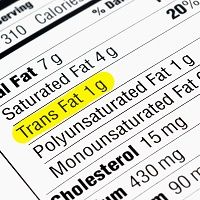Article
Dietary Trans Fatty Acids: Fading in Our Memories
Author(s):
Dietary trans fatty acids have had their heyday and are fading from the American food landscape. Once ubiquitous in margarine, snack food, packaged baked goods, and fried fast food, they have been associated with adverse effects on lipid profiles, metabolic function, insulin resistance, inflammation, and cardiac and general health.

Dietary trans fatty acids (dTFAs) have had their heyday and are fading from the American food landscape. Once ubiquitous in margarine, snack food, packaged baked goods, and fried fast food, they have been associated with adverse effects on lipid profiles, metabolic function, insulin resistance, inflammation, and cardiac and general health.
A team of researchers from the University of Cologne, Germany recognized that all of these adverse outcomes can alter cognitive function. They have published a study designed to assess the effect in the electronic journal PLOS One.
The researchers analyzed cross-sectional data from the 1999-2005 University of California Sand Diego Statin Study. Although the original study included men and women, this study focused on 694 men because of a more representative age distribution. They assessed participants’ word memory and compared it with estimated dTFA (grams/day). Later, they examined major findings in the entire (men and women) sample.
dTFA intake inversely predicted memory in adults younger than 45 years in significant magnitude. For every gram/day dTFA consumed, patients recalled 0.76 fewer words. Some participants ingested up to 28 grams/day of dTFA. At that consumption, a man who was younger than 45 could be expected to miss approximately 21 word-recall responses, reducing his cognitive score considerably.
Previous studies have not looked at dTFAs and cognition, so this is new finding. Previous studies have, however, linked dTFAs to changed behavior and mood.
The authors noted that dTFA-related mechanisms influenced metabolic parameters (blood pressure, waist circumference and BMI) in parallel with cognition. They suggest that dTFA affects oxidative stress and cell energy, causing most of its adverse effects in all systems independently and simultaneously.
The US Food and Drug Administration has banned dTFAs in food, directing manufacturers to phase out this additive before 2018. Despite the cost to manufacturers ($6.2 billion over 20 years), the benefits are expected to be staggering. Health savings alone over 20 years are estimated at $140 billion. Most manufacturers are moving to saturated palm, soybean and sunflower oils.




